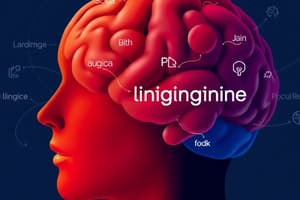Podcast
Questions and Answers
What is the primary focus of psycholinguistics?
What is the primary focus of psycholinguistics?
- Creating new linguistic theories
- The study of phonetics
- Understanding language origin
- Examining the relationship between language and mental processes (correct)
How does psycholinguistics differ from traditional linguistics?
How does psycholinguistics differ from traditional linguistics?
- It includes the cognitive processes behind language use. (correct)
- It solely focuses on syntax and semantics.
- It studies language in isolation from other disciplines.
- It is limited to spoken language only.
What type of knowledge does a baseball pitcher demonstrate when throwing without knowing the specific muscle movements?
What type of knowledge does a baseball pitcher demonstrate when throwing without knowing the specific muscle movements?
- Pragmatic knowledge
- Tacit knowledge (correct)
- Explicit knowledge
- Semantic knowledge
Which theme of psycholinguistics focuses on the meanings of words and sentences?
Which theme of psycholinguistics focuses on the meanings of words and sentences?
Transforming tacit knowledge into explicit knowledge primarily involves what action?
Transforming tacit knowledge into explicit knowledge primarily involves what action?
Which area of psycholinguistics studies the social rules of language usage?
Which area of psycholinguistics studies the social rules of language usage?
What does explicit knowledge in language use typically involve?
What does explicit knowledge in language use typically involve?
The integration of insights from which fields contributes to the development of psycholinguistics?
The integration of insights from which fields contributes to the development of psycholinguistics?
Flashcards
What is Psycholinguistics?
What is Psycholinguistics?
Psycholinguistics is the study of how people use and understand language. It examines how language is processed in the brain, and how this process relates to our understanding of the world around us.
What fields contribute to Psycholinguistics?
What fields contribute to Psycholinguistics?
Psycholinguistics draws on knowledge from various fields, including psychology, linguistics, computer science, neuroscience, and philosophy. It uses a combination of these fields to gain a complete understanding of language processing.
How does Psycholinguistics differ from Linguistics?
How does Psycholinguistics differ from Linguistics?
Linguistics primarily focuses on the structure and function of language. Psycholinguistics, in contrast, investigates how people acquire, process, and use language within their mental systems.
What's the difference between Tacit and Explicit Knowledge?
What's the difference between Tacit and Explicit Knowledge?
Signup and view all the flashcards
How do we acquire language knowledge?
How do we acquire language knowledge?
Signup and view all the flashcards
What is Semantics?
What is Semantics?
Signup and view all the flashcards
What is Syntax?
What is Syntax?
Signup and view all the flashcards
What is Phonology?
What is Phonology?
Signup and view all the flashcards
Study Notes
Psycholinguistics Scope
- Psycholinguistics is a subfield of cognitive science
- It draws on insights from psychology, linguistics, computer science, neuroscience, and philosophy
- It studies mental processes related to language, including problem-solving, memory, imagery, and language itself
- The field examines how language is integrated and studied by different disciplines
Language Processes and Linguistic Knowledge
- Psycholinguistic work focuses on two key questions:
- What language knowledge is needed for language use?
- How are language processes performed?
- Tacit knowledge: knowledge of how to perform various acts (e.g., throwing a baseball)
- Explicit knowledge: knowledge of the processes or mechanisms behind the acts
- Much linguistic knowledge is tacit rather than explicit
- Reading psycholinguistic texts can make tacit knowledge explicit
Introduction: Themes of Psycholinguistics
- Core areas of language knowledge include semantics (meaning of sentences and words), syntax (grammatical structure), phonology (sound system), and pragmatics (social rules)
Studying That Suits You
Use AI to generate personalized quizzes and flashcards to suit your learning preferences.




